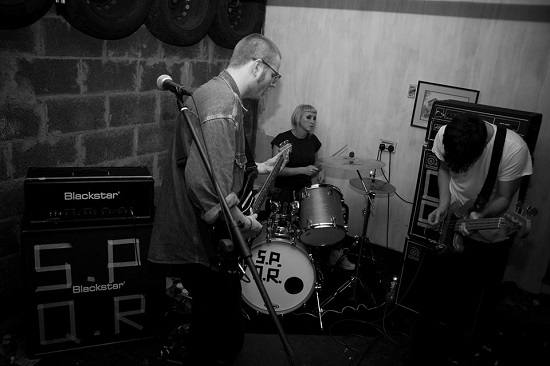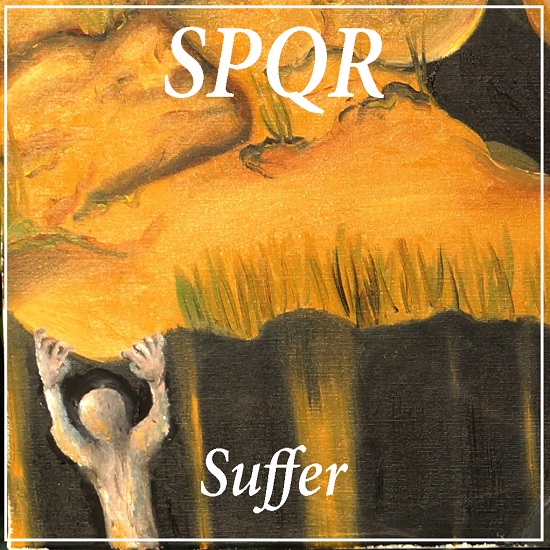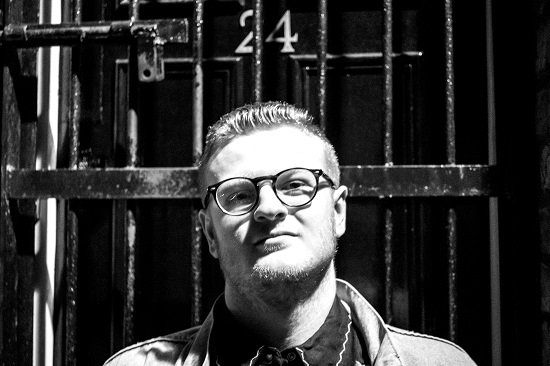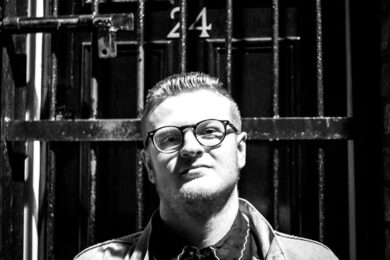Meeting them in person – shy, nervous, and polite in the extreme – you wouldn’t think that Merseyside-based trio SPQR were capable of the dark, furious presence they possess when on stage. I first came across them live when covering Liverpool’s superb new festival for the freak scene, WRONG Festival, for these hallowed pages, earlier this year, though had heard rumblings that they were one of the city’s more promising new prospects. When I eventually caught them, though they were only the second band on the bill and taking to the largest stage early on a sunny Saturday afternoon, they still managed to elicit an immensely satisfying air of opaque claustrophobia, frontman Peter Harrison’s frantic, frenetic guitar sounding completely all over the place in the best possible way. "That was the softest we’ve ever been," he says, having taken the trip to meet me in London along with drummer Bex Denton. "When we play a dead sweaty, dungeon kind of gig the atmosphere can be so good, you can really go mental."
Their recorded output, too, has its own qualities. Their new single ‘Suffer’, which is premiering exclusively with tQ in this article, makes a good case in point. A wonky, lurching stomp of a verse that gives way to a searing launch of a chorus, sparse in terms of texture yet so deeply rich with personality, Harrison’s voice somehow both fragile and powerful, if nothing else, SPQR have character.
Which is why it’s so fascinating to find that in person, the two are so friendly, easygoing and considered. "I’m paranoid about how boring I am compared to it being so extreme on stage…" says Denton, but Harrison’s proud of the ordinariness of his everyday life. "I wanted to mention this, actually, because this is important to me. I love that we’re super intense and unhinged on stage, but when we’re offstage it’s totally different. I’m so proud of that, it shows that you’re not a fucking dickhead. I just want people to start being normal again. Musicians in general are just fucking dickheads, posing, acting like they’re rock ‘n’ roll. It’s not cool any more, I don’t think it ever was. I’m just dying for a musician just to be a fucking person."
That’s not to say they’re a dull interview. Denton, for a start, cuts up dead bodies for a living, and the band used to rehearse in the spare room of a veterinary clinic. Harrison approaches a live set like a method actor, he takes a moment before each show, he says, to summon every ounce of bottled anger, sadness and paranoia, unleashing it to be channelled through their live set. Below, after the premiere of their new single ‘Suffer’, they tell us all.
Can you take me through the early days of SPQR?
Peter Harrison: I’ve always loved heavy music, you see loads of bands and they’re very safe, but the music I’ve always liked comes from darker emotions. I’ve got a lot of dark feelings that I thought I could get across quite well!
Bex Denton: Don’t brush past the fact that you used to rehearse in a vet’s clinic.
PH: I was working at the vet’s, it was a big, lovely massive house with three floors, the first floor was the pet stuff, the top floor was somebody’s flat, and then the middle floor was offices and us. We used to practise in the ‘recreational area’
Is it true that one of you cuts up dead bodies for a living?
BD: I did anatomy at uni, I chopped up dead people for three years, I had no idea what I was gonna do with that, but then I saw this job advertised and I thought, ‘you can do that as a job?!’ You’ve heard of organ donation, but people donate their tissues, their eyeballs, their heart valves, skin, bones, tendons, so it’s my job to go round the country to all the different mortuaries and remove them! I’ve done it for maybe twelve years, so I’m desensitised to it now, I have to remember it’s a bit odd…
Do you enjoy it?
BD: Not as much as I used to.
Is it a case of once you’ve seen one dead body, you’ve seen them all?
BD: You really haven’t, the things we see… I said the other day, if only you could know what I’ve seen today. Because we’re in mortuaries we see traffic accidents, people that have been hit by trains, dead kids, it gets pretty heavy, badly decomposed bodies…
PH: I’m a barista… I don’t feel as important.
BD: That’s important too! Coffee is important.
You only have two songs online at the moment, they seem different to when I saw you live at WRONG festival, they’re more heavy on melody than the intensity of the live set.
BD: I’m not sure if people would listen to our recorded stuff and expect that to be the live show, I think it is different.
PH: And those tracks were very early on.
Are things changing with your new recorded output?
PH: Yes, but capturing it is hard, there’s just no way you can get that level of intensity on record
You’ve got a new EP on the way, how would you describe it?
PH: It’s dark. Am I allowed to say my songs are intelligent?
BD: Ha! You can if you want to sound massively pretentious…
PH: I’m terrible, aren’t I. You can tell there’s a lot of thought that’s gone into it, I like to think people will listen to it and feel how it was recorded late at night after work, alone in a studio. I hope they can hear it on the record, that’d be amazing.
Where do you think the macabre element comes from?
BD: We do have quite a dark sense of humour
And you do cut up dead bodies for a living…
BD: I am quite morbidly curious!
PH: I’m not a positive person, I’ve always grown up in a house that was very much ‘say your feelings’, but it was also very negative, all about things going wrong and people getting angry, but being allowed to express it.
BD: I’d hope that the humour comes across too! Do you ever watch Psychoville and the League of Gentlemen? That’s how I see our music, as dark, dry, macabre but also funny.
Tell me about your approach your guitar, in the best possible way, it’s kind of all over the place
PH: I don’t have a clue what I’m doing! I think Nirvana taught me that as a guitarist it’s OK to be shit, they weren’t shit at their instruments, but you don’t have to be technically amazing, you can have all these horrible bends, Josh Homme does loads of solos that just sound horrendous in the best way.

How about as a drummer?
BD: It’s weird for me, I played when I was young but then I stopped for 10 years and only started again about two and a half years ago.
Was it easy to pick back up again?
BD: Yeah, but I massively regret that break because now, technically I’d be so much better, I do feel the pressure to be technically amazing, but I suppose it has an edge to it.
PH: I like the essence of having to always be winging it. I don’t want to be in Steely Dan.
How do you feel about being called a ‘Liverpool band’?
PH: I hate it. I don’t want to be an anything band. I just want to be a band. When you hear ‘Liverpool band’ you just think about the fucking Beatles. I like The Beatles, but I don’t want to be associated with them.
BD: I’m from Wales originally, I’m in love with Liverpool and I feel very proud of what’s happening in music there at the moment, but I agree.
PH: One of my concerns is that next step. We’re in the middle of the process of booking a tour at the moment, it’s such an exciting prospect to play to different crowds. It’s always the best if they haven’t seen it before.
You’ve been described as having a ‘cult following’. Do you?
BD: I hope so!
PH: The live show is something you’ll either think is the best thing you’ve ever seen, or ‘what the hell is this crap’. We’ve had gigs when the whole audience just took the piss. We played an awards show once, as we left stage I think one of them shouted ‘that was horrible!’ But then some people say it’s the best thing they’ve seen in a long time.
BD: I suppose that’s what being a cult band is… having only a small amount of people be really passionate… But we’ve discussed that before, all we want is to have the people who genuinely care about you listening to what you’re doing, even if there’s only ten of them.
What to you would quantify success?
PH: I would like to live off the music. Have enough money to not have to do a day job, to have free time where I can write and record, I’d like to not have stuff in my way. And to play shows around the country, I’ve not even thought about the world yet.
Have you never had dreams of playing to an arena?
PH: It would only get to that stage if it changed drastically, because as it is it would be crap as shit. I feel stupid on a big stage, we’re meant for grotty, sweaty venues. A lot of three pieces, when they get to festivals, they just lose everything.
BD: It’s not what we’re aiming for at all.
PH: I just want to say ‘I’m a musician’, and off my own back. I don’t want to teach music in a high school, Jesus Christ…
What’s your most rock ‘n’ roll moment?
PH: All I’ve ever done is do nothing and write songs. That’s it.
BD: We discuss this quite a lot, I’m paranoid about how boring I am compared to it being so extreme on stage.
PH: No. I wanted to mention this, actually, because this is important to me. I love that we’re super intense and unhinged on stage, but when we’re offstage it’s totally different. I’m so proud of that, it shows that you’re not a fucking dickhead. I just want people to start being normal again. Musicians in general are just fucking dickeheads, posing, acting like they’re rock ‘n’ roll, I’m just dying for a musician just to be a fucking person. It’s not cool any more, I don’t think it ever was. I’m so proud to say that after the most intense show and give it the most energy, I’ll go home and drink tea.
Were you never drawn in by the alien magnetism of someone like David Bowie?
PH: No. The normal stuff appeals to me, when you see them in documentaries doing normal stuff. To me that’s more amazing.
To me there is something to be enjoyed in total excess.
BD: It’s entertaining, isn’t it, we’ll never have stories like that. All we’ve got is ‘Remember that time Pete Harrison from SPQR went home and drank four cups of tea?’
PH: The point is that the music does it all. We don’t want to force anything.
BD: I feel a pressure to put the act on when everyone around us is ‘we’ve done this, we’ve done that.’ Most of the time they haven’t.
If it wasn’t the romanticism of excess, what did get you into playing music?
PH: Emotive stuff on stage, just seeing someone properly using that outlet. That’s the way I like to do it. I’m the biggest fan of Jamie Lenman, he was in the band Reuben and when I first saw him live it was like a conduit of emotion. I thought ‘this is it’. I’m always looking for that in other bands, it’s so difficult to find. Sometimes bands are doing really heavy stuff, but it’s about rekindling it when you play.

How do you rekindle it?
PH: I have a method, Bex doesn’t know about this. On the day of the gig there’s always going to be something that upsets you, and I store it all, I don’t think about it at all until I’m about to go on stage, then I let it all in.
It’s almost like method acting… does that not become pretty taxing mentally?
BD: After our shows he’ll lie on the floor and not move. This is actually the first time he’s explained why that happens.
PH: I have to talk to people, but it’s just like, ‘let me die’. We don’t warm up, we go straight from nothing to everything, I do a lot of straining, by the second song I’m about to throw up. One day that will actually happen.
It begs the question, if playing live is so traumatic, why do you keep doing it?
PH: It’s the release of it all, that’s the best feeling in the world. If I was feeling bad here now and suddenly stood up and started smashing stuff and shouting… you just don’t get to do that in almost any other job.



